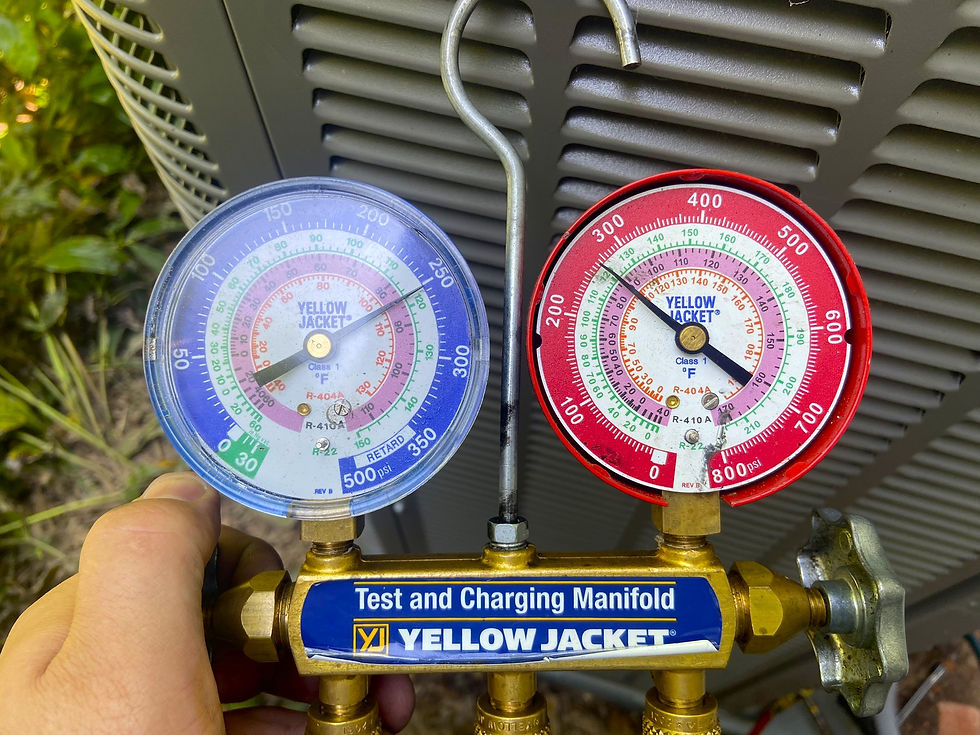Natural Gas Prices & Your Heating System
- Arianne Large

- Nov 1, 2021
- 4 min read
Updated: Jul 26, 2022
Heating and cooling account for a considerable percentage of your energy bills. The U.S. Energy Information Administration (EIA) reports that 49% of American households rely on natural gas as their main heating source.
The EIA projects that natural gas winter heating bills will be up 30% for the 2021/2022 Winter heating season. That's due to a combination of higher costs for fuel, more time spent at home, and a colder than normal winter, one The Old Farmer's Almanac is calling the "season of shivers."

The cost to heat your home is determined by several factors, including:
Gas Furnace Age and Efficiency
Natural Gas Prices
Ductwork
Heat Loss
Thermostat Settings
Change Your Filters
Routine Maintenance
Gas Furnace Efficiency
Do you know the Annual Fuel Utilization Efficiency (AFUE) of your gas furnace? This rating is indicated as a percentage and measures how much energy is being converted to heat. For example, a furnace with a 90% AFUE rating means that 90% of the fuel (NG/LP) you're consuming is being used to heat the home, while the other 10% is wasted as it escapes as exhaust through the flue pipe. If your furnace is old and inefficient, you may want to invest in a new, higher-efficiency furnace. Piedmont Natural Gas offers incentives to make some energy upgrades.
Natural Gas Prices
Piedmont Natural Gas, the natural gas supplier for North Carolina and South Carolina, issued a Notice of Temporary Rates stating they intend to implement increased rates and charges on a temporary basis effective November 1, 2021. According to Duke Energy, the estimated cumulative monthly bill increase for the average customer in the Carolinas is expected to be approximately $11 per month.
Ask PNG about their equal payment program. The EPP program levels out a customer's natural gas bills, allowing them to pay a predictable, equal monthly amount to help avoid drastic billing surprises. PNG determines this payment by adding up a customer's annual natural gas usage and then dividing it into the same payment amount each month.
Ductwork
Air duct systems that are not properly sealed are one of the leading causes of high gas bills. As much as 30% of heated air can be lost to leaks in the ductwork. Your air duct system carries air throughout your home to heat and cool. Leaks in your ductwork mean it will take more energy and money to heat your home. If you intend to handle this yourself, do not use regular duct tape. The adhesive cannot withstand the changes in temperatures that your attic or crawlspace endure.
The best way to fix these leaks and save on gas is by calling the professionals of Helms Heating & Air to seal any areas where air leaks are detected.
Heat Loss
Don't let heat escape unnecessarily. Air leaks can greatly impact your home's energy efficiency and increase your natural gas bill. Look for gaps and feel for drafts around baseboards, pipes, doors, windows, electrical & cable outlets, and unused chimneys.
Caulking and weather stripping are the most common ways to cut air leaks around windows and doors. Install or replace worn weather stripping around your doors and windows to seal in the warm air. Turn bath fans and kitchen hood vent fans off when they are not needed.
Make sure your home is adequately insulated. Insulation disintegrates over time. Even if your home was properly insulated at one time, you may need to add more as your home ages.
Thermostat Settings
Lowering your thermostat's temperature setting by even a couple degrees can make a difference in your bill, helping you save as much as 5 to 10%. Invest in a smart thermostat that will allow you to control the settings via your smartphone or computer. On average, an ENERGY STAR smart thermostat can save you approximately 8% on your heating and cooling bills.
If you're not interested in all of the bells and whistles, simply use the programmable setting on your thermostat and adjust the heat to run less when no one is home or everyone is in bed.
Change Your Filters
Dirty filters are the number one cause of furnace problems. If your filter gets clogged, it will reduce your heating system's air intake. It can cause the system to be overworked, causing major components to wear down or fail. Replace your filters every one to three months depending on the type of filter. The cleaner the filter, the less strain on your HVAC system.
Routine Maintenance
Sometimes you have to spend to save. Have your furnace inspected every year. You can save on your gas bills, extend the lifespan of your heating system, maximize your system's efficiency, ensure safety, and lessen the chances of needing emergency repairs. During heating season, the technician will:
test carbon monoxide levels
check/adjust your gas pressures
test for safe and proper operation of the ignition system
check flue/exhaust for proper venting
inspect your heat exchanger and burners
check safety controls and electrical connections
inspect your ductwork for air leaks
and much more!
The peace of mind that comes with a well-maintained and energy-efficient natural gas furnace is priceless!
For maximum savings, sign up for our annual Maintenance Agreement. We'll remind your when it's time to schedule routine maintenance for your heating system in the Fall/Winter and your cooling system in the Spring/Summer!



